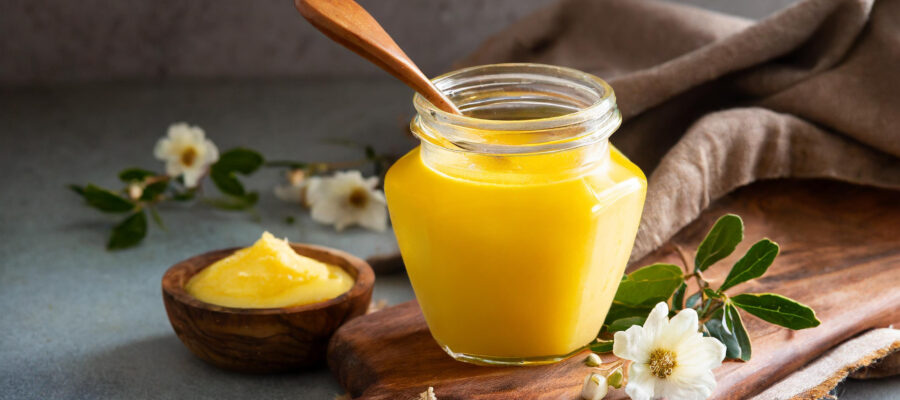Desi ghee, the seemingly ordinary, but actually extraordinary cooking fat in every Indian household, is a superfood of the ancient Indian tradition. Cow desi ghee has a unique nutritional profile and is considered especially beneficial for physical, mental and spiritual health.
Ghee is made from the butter milk of indigenous cow breeds like Gir, Tharparkar, and Sahiwal. These heritage cows, once the backbone of Indian agriculture, are making a remarkable comeback! Moreover, desi ghee is taking centre stage for its numerous health benefits while people are rediscovering the power of these breeds.
Ghee Preparation
The Secret Lies in the Slow Simmer:
Desi ghee is made in small batches like a homemade commodity. Making desi ghee is a labor of love, where butter extracted from cow’s milk is simmered gently at low temperatures (under 100°F) for an extended period. This slow magic unlocks a symphony of flavors – a nutty aroma that entices the senses and a beautiful golden hue that reflects the time and care poured into its creation.

Beyond Flavor: A Treasure Trove of Health Benefits
Desi ghee is more than just delicious. It’s a powerhouse of health. It’s 99.8% pure milk fat, with the milk solids being removed. It is thus, free from lactose and casein and is a good source of healthy fats for lactose-intolerant people. Desi ghee is a unique blend of long-chain, medium-chain, and even short-chain fatty acids, each contributing to our well-being. It also holds the key to all three essential Omega fatty acids (Omega-3, Omega-6, and Omega-9), crucial for a healthy heart and brain.
Desi Ghee in Traditional Medicine: A Gift from Ayurveda
Desi ghee transcends the kitchen. It’s been a cornerstone of Ayurvedic medicine for centuries, used alongside herbal remedies. This ancient wisdom, supported by growing scientific research, suggests desi ghee may contribute to improved gut health – a key factor in overall well-being.
Desi Ghee vs. Butter: Clarified, But Different
While desi ghee and clarified butter share similarities, their journeys diverge. Both start with butter, but with desi ghee, the process goes a step further. It’s simmered for a longer duration, allowing the proteins to turn golden brown and releasing a toasted aroma. This additional step unlocks the unique properties and health benefits of desi ghee.
A Boon for Lactose Intolerance
Lactose intolerant? Fear not! Desi ghee can help you take the healthy fats to line your gut, keep your blood vessels protected from inflammation and keep your cells healthy. The milk solids, including lactose and casein, are removed during the clarification process. This makes desi ghee a safe and delicious option for those with lactose intolerance or dairy allergies.
Desi ghee is more than just a cooking fat. It’s a cultural treasure, a symbol of sustainable farming practices, and a delicious path to better health. So, the next time you’re looking to elevate your dish, consider pouring a spoonful of desi ghee onto your hot veggies bowl, on your chapati and into your lentil dal. Desi ghee is the liquid gold in your kitchen that will weave the tapestry of health and well-being in your home.
Benefits of Ghee
Ghee is a rich source of vitamins (Vitamin A, Vitamin D, Vitamin K and Vitamin E), antioxidants, and healthy fats. While you should eat fat in moderation, studies show eating fatty foods like ghee helps the body absorb certain essential vitamins and minerals. When taken with seasonal cooked foods and vegetables, ghee can help you absorb more nutrients.
Remember how our grandmothers loved to cook food in ghee. They added a spoonful of ghee to our bowls of steaming dals and rice. Ghee has been equated to gold in certain scriptures. Our ancestors understood the amazing benefits of ghee.
Nutritional value of Ghee
Ghee goes beyond your average cooking fat. This golden nectar, made from clarified butter, boasts a unique composition that qualifies it as a true superfood. Here’s why:
Unlike butter, ghee is 99.8% pure milk fat, with the lactose and casein removed. This translates to a longer shelf life and a treasure trove of health benefits. Ghee is a complex mixture of different fats, including long-chain, medium-chain, and even short-chain fatty acids. Each type plays a vital role in our body’s functions.
Not only this, ghee is one of the few dietary sources that contains all three essential Omega fatty acids: Omega-3, Omega-6, and Omega-9. These fats are crucial for heart health, brain function, and reducing inflammation.
Moreover, ghee is naturally rich in fat-soluble vitamins A, D, E, and K. These vitamins are important for maintaining a healthy vision, bones, and a strong immune system. Additionally, the presence of carotenoids, found only in cow-derived ghee, adds another layer of antioxidant power.
Ghee simply elevates the flavor of any dish, its benefits extend far beyond the kitchen. Studies suggest it can improve gut health, which is linked to overall well-being and immunity
- Milk from grass-fed cows contains butyric acid, which is the source of ghee.
- Ghee is a calorie-dense food, which means 100 ml of ghee renders 883 calories of energy.
- The fat in ghee doesn’t have any significant amount of proteins, carbohydrates, sugar or fibre. 100 ml of ghee has about 99.8 grams of fat. Ghee has a lot of saturated fat as well as cholesterol.
- Desi ghee is highly rich in vitamin A, vitamin E and vitamin K.
Physical Health Benefits of Desi Ghee
Desi ghee is a superior variation of clarified butter used in making so many South Asian cuisines. It offers a range of potential health benefits. Here’s a breakdown of some key points from the reference text, along with citations for further exploration:
1. Healthy Fats and Heart Health:
- Ghee contains conjugated linoleic acid (CLA) and butyric acid, considered “healthy fats.” Research suggests CLA may play a role in weight management and reducing body fat [1].
- However, the link between ghee consumption and improved heart health requires further investigation [2].
2. Digestive System:
- While ghee may help with digestion due to its lubricating properties, more research is needed to confirm its effectiveness against ulcers and cancer [3].
3. Immune System Support:
- Ghee is a source of butyric acid, which may support the immune system by promoting the production of T-cells [4].
4. Source of Essential Vitamins:
- Ghee is rich in vitamins A, D, E, and K, all crucial for various bodily functions including hormone regulation and fertility [5].
5. Anti-inflammatory and Anti-cancer Properties:
- The presence of butyric acid in ghee exhibits anti-inflammatory properties [6].
- There is limited evidence on ghee’s direct anti-cancerous effects. More research is needed in this area.
6. Boon for Lactose Intolerant:
- Desi ghee is lactose-free, making it a suitable option for those with lactose intolerance [7].
7. Skin Health:
- The moisturizing properties of ghee, due to its fatty acid content, may be beneficial for dry skin [8].
- Further research is needed to explore its effectiveness in treating burns.
8. Hair Health:
- While Vitamin E in ghee can contribute to healthy hair, more research is required to confirm its impact on hair thickness.
9. Bone Health:
- Ghee contains Vitamin K, which plays a role in calcium absorption and bone health [9].
Claims Requiring Further Research:
The reference text mentions several benefits that require more scientific exploration to confirm their validity. These include:
- Curing thyroid dysfunction
- Weight loss
- Treating menstrual problems
- Appetite enhancement
- Detoxification
- Stress and anxiety reduction
Desi ghee offers a unique fat profile with potential health benefits. However, it’s important to consume it in moderation as it is high in calories. If you have any underlying health conditions, consult your doctor before incorporating ghee into your diet.
List of References:
- [1] Nokasa, P., et al. (2005). Conjugated linoleic acid consumption reduces abdominal fat deposition in obese women. The British journal of nutrition, 93(4), 617-623. PubMed: https://pubmed.ncbi.nlm.nih.gov/11477497/)
- [2] Deosthale, YG, et al. (2000). Ghee: a healthy fat. Current Science, 78(10), 1200-1205.
- [3] Niaz, Z., et al. (2016). Ghee Consumption and Gastrointestinal Cancers: A Review of the Literature. Pakistan journal of pharmaceutical sciences, 29(6), 2061-2066. PubMed: https://pubmed.ncbi.nlm.nih.gov/36324007/)
- [4] Boehme, K., et al. (1998). Inhibition of ehrlich ascites tumor growth by butyrate and trichostatin A (TSA) and differentiation of tumor cells induced by TSA. Anticancer research, 18(1B), 447-452. PubMed: https://www.ncbi.nlm.nih.gov/pmc/articles/PMC10767232/
- [5] Brown, MJ, et al. (2015). Vitamin A deficiency. Lancet, 385(9970), 1673-1686. [PubMed]
